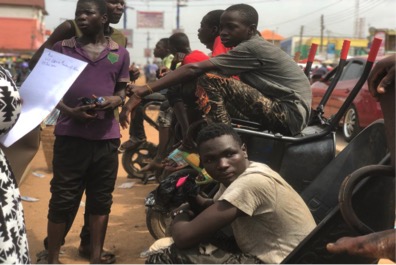The Prosecutor for the Ashaiman Municipal Assembly (AshMA), George Katey, has entreated Metropolitan, Municipal and District Assemblies (MMDAs) to desist from targeting vagrants (the homeless, truck pushers, motor riders, head porters) and other categories of poor persons for arrests because they constantly find themselves at the wrong side of the law.
According to him, these persons are poor and their ignorance causes them to break the laws that govern the affairs of the local government areas.
Mr. Katey made the comment when a CCF monitoring team called on him to discuss some issues identified by its Monitoring Team on Monday, 6th December 2021.
The monitoring within AshMA forms part of the implementation of CCF’s “Decriminalizing Vagrancy Laws and Advocacy” project which is supported by the Open Society Initiative for West Africa (OSIWA).
Speaking to the team, Mr. Katey indicated that the vagrants constantly violate bye-laws of Assemblies leading to their arrests, imposition of fines, and imprisonment because the Assemblies do not provide adequate sensitization on the laws.
Augmenting his argument, he cited the sale of expired products by some illiterate traders in violation of the Public Health Act and how they conduct business at unauthorized locations because they cannot afford market spaces. This he said leads to seizure of their goods, arrests, fines, loss of business capital, and imprisonments.
To reduce the vulnerability of such persons, he recommended that MMDAs should constantly educate them on the relevant laws. He also suggested the employment of behavioral change experts who can effectively lead the education on the laws in order to change attitudes of vagrants and other vulnerable groups within the Assemblies.
He expressed worry that in the absence of the suggestions, the situation will linger on and the conditions of the vagrants and other vulnerable groups will further deteriorate as the fines imposed on them and imprisonments will only increase their already impoverished lives affecting the society at large.
About the CCF-OSIWA Project:
Since May 2021, CCF has been implementing the “Decriminalizing Vagrancy Laws and Advocacy” project in 12 MMDAs in Greater Accra, Central and Ashanti Regions. The main aim of the project is to create an enabling environment for the homeless/vagrants to know, claim and exercise their rights to end criminalization of homeless persons and other categories of people affected by vagrancy laws in Ghana. The monitoring of the effects of vagrancy laws under the project seeks to identify peculiar issues that affect vagrants and other poor persons in the implementation of the Assembly bye-laws and other vagrancy laws that appear to affect the poor disproportionately. This intervention is consistent with SDG #16.3: Access to Justice for All by 2030 and a recent opinion ruling on ‘vagrancy laws’ delivered by the African Courts on Human and People’s Rights.
About OSIWA:
Established in 2000, OSIWA is a grant-making and advocacy organization focused on equality, justice, democratic governance, human rights, and knowledge generation. It is part of the global network of Open Society Foundations spread across 37 countries around the world.

















































